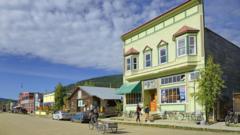Dawson City, a community of approximately 2,400 residents nestled in Yukon Territory, Canada, is facing a governance standstill after its newly elected officials declined to swear allegiance to King Charles III during their swearing-in process. The mayor-elect, Stephen Johnson, and the new council were set to take their oaths early this month after being elected last month, but their refusal has created a delay.
Johnson stated that their decision stems from solidarity with a fellow councillor, Darwyn Lynn, who is a member of the Tr’ondëk Hwëch’in First Nation. Lynn expressed hesitance towards the traditional oath, citing the Crown's troubling relationship with Canada’s Indigenous peoples. Under Yukon legislation, newly elected officials are required to take the oath within 40 days of their election, or else their victories will be deemed invalid.
The council must complete the oath by December 9, or risk nullifying their election. Johnson articulated the challenges the council now faces: "We can't do anything legally required of us under the Municipal Act," indicating the council's inability to govern or make essential decisions until this issue is resolved.
In a statement to the Canadian Press, Johnson clarified that their actions are not intended to disrespect King Charles or provoke national unrest but are instead a unified stance focusing on local solidarity with Indigenous rights. The council is now exploring the possibility of establishing an alternative oath, having formally approached Yukon provincial officials for options. A spokesperson from the Yukon Department of Community Services confirmed receipt of the request but offered no comment on its approval status.
Outgoing mayor Bill Kendrick voiced his hope for a resolution so the newly elected council can commence their duties. Feedback from the community regarding this standoff has been diverse, with some community members considering the oath outdated, while others view it as essential to Canada's governance structure.
Dawson City, renowned for its pivotal role during the Klondike Gold Rush in 1896, occupies a significant part of Indigenous history as it was built upon Tr’ochëk, a site used for hunting and fishing by the Tr’ondëk Hwëch’in. This historic backdrop aggravates the ongoing dialogue about Canada’s colonial past and the need for reconciliation.
In recent years, Canada has taken strides towards acknowledging its colonial legacy. Prime Minister Justin Trudeau emphasized this in 2017, describing the legacy of colonialism in Canada as one of "humiliation, neglect, and abuse." The conversation around such oaths continues to evolve, seen previously in Quebec where legislation was passed to eliminate the requirement for elected officials to pledge allegiance to the monarchy, viewed by some as a relic of a bygone era.
This refusal to take an oath is not unprecedented. Earlier in the year, a proposed bill aimed at curtailing the obligation to pledge allegiance to the monarchy was debated in Canada’s national parliament, but ultimately voted down. As Dawson City navigates this delicate political landscape, the focus remains on seeking resolution while fostering respect for Indigenous groups and addressing historical injustices.




















